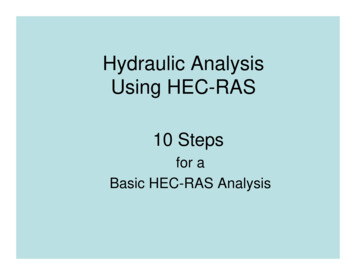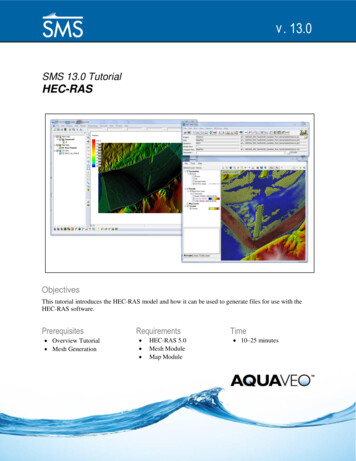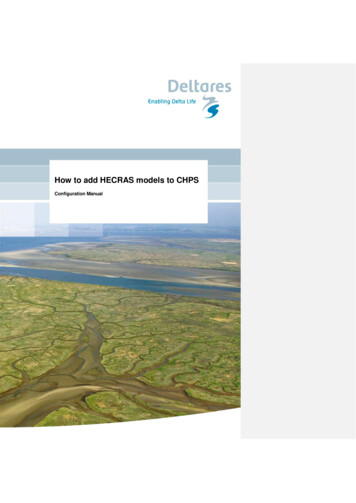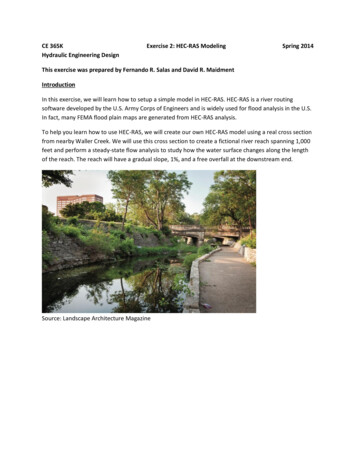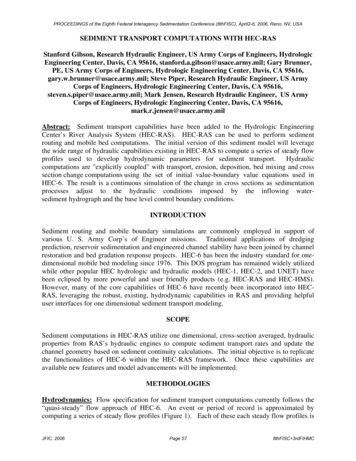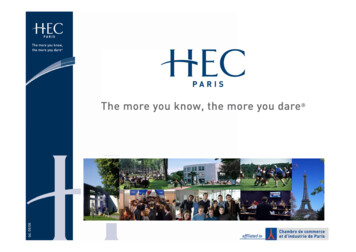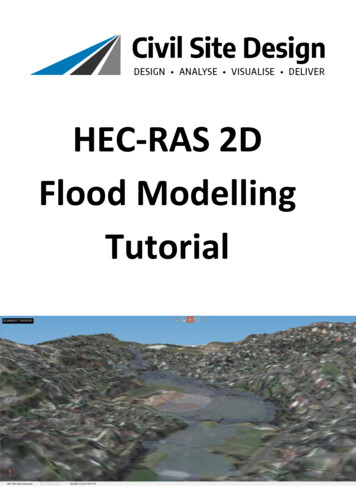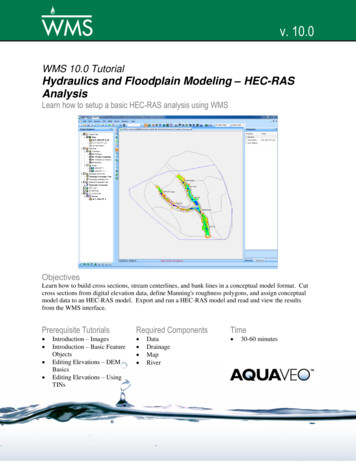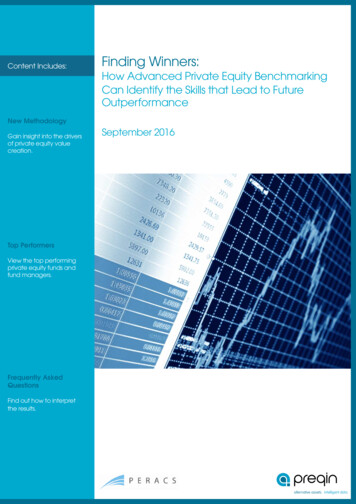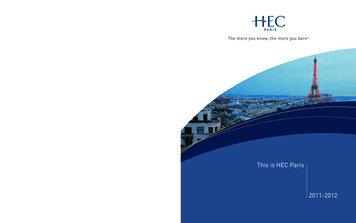
Transcription
CURRICULUMOFCOMPUTER SCIENCE,SOFTWARE ENGINEERING, ANDINFORMATION TECHNOLOGY(Bachelors & Masters Programs)(Revised 2017)HIGHER EDUCATION COMMISSIONISLAMABADCURRICULUM DIVISION, HEC1
Prof. Dr. Mukhtar AhmedChairman, HECProf. Dr. Arshad AliExecutive Director, HECMr. Muhammad Raza Chohan Director General (Academics)Dr. Muhammad IdreesDirector (Curriculum)Syeda Sanober RizviDeputy Director (Curriculum)Mr. Riaz-ul-HaqueMr. Muhammad Faisal KhanAssistant Director (Curriculum)Assistant Director (Curriculum)2
CONTENTSContentsCURRICULUM OF COMPUTING PROGRAMS .INTRODUCTION .Curricula Consideration .Computing Discipline .Introduction .Bachelor Degree Programs in Computing .Eligibility Criteria .Duration .Degree Completion Requirements .Master Degree Programs in Computing .Eligibility Criteria .Duration .Degree Completion Requirements .Program Learning Outcomes (PLOs) .Curriculum Design for Bachelor Degrees in Computing .COURSES COMMON for BS (CS/ IT/ SE) .Computer Science Program BS (CS) .Development in Computer Science .Program Structure: .BS Computer Science .Coverage of ACM Knowledge Areas .Proposed Curriculum for BS-CS .COURSES COMMON to all computing bachelor programs .Domain Courses for BS (COMPUTER SCIENCE) .Proposed Study Plan for BS (Computer Science) .Proposed Curriculum for BS-IT .COURSES COMMON to all computing bachelor programs .Domain Courses for BS-IT .Proposed Study Plan for BS (Information Technology) .BS Software Engineering .Proposed Curriculum for BS-SE.COURSES COMMON to all computing bachelor programs .Domain Courses for BS-SE .Proposed Study Plan for BS (Software Engineering) .Master of Science .Programs .Composed by: Mr. Zulfiqar Ali, HEC, Islamabad3
PREFACEThe curriculum, with varying definitions, is said to be a plan of the teaching-learningprocess that students of an academic program are required to undergo to achieve somespecific objectives. It includes scheme of studies, objectives & learning outcomes,course contents, teaching methodologies and assessment/ evaluation. Since knowledgein all disciplines and fields is expanding at a fast pace and new disciplines are alsoemerging; it is imperative that curricula be developed and revised accordingly.University Grants Commission (UGC) was designated as the competent authority todevelop, review and revise curricula beyond Class-XII vide Section 3, Sub-Section 2(ii), Act of Parliament No. X of 1976 titled “Supervision of Curricula and Textbooksand Maintenance of Standard of Education”. With the repeal of UGC Act, the samefunction was assigned to the Higher Education Commission (HEC) under its Ordinanceof 2002, Section 10, Sub-Section 1 (v).In compliance with the above provisions, the Curriculum Division of HEC undertakesthe revision of curricula regularly through respective National Curriculum RevisionCommittees (NCRCs) which consist of eminent professors and researchers of relevantfields from public and private sector universities, R&D organizations, councils,industry and civil society by seeking nominations from their organizations.In order to impart quality education which is at par with indigenous needs andinternational standards, HEC NCRCs have developed unified framework/ templates asguidelines for the development and revision of curricula in the disciplines of BasicSciences, Applied Sciences, Social Sciences, Agriculture and Engineering.It is hoped that this curriculum document, prepared by the respective NCRC’s, wouldserve the purpose of meeting our national, social and economic needs, and it wouldalso provide the level of competency specified in Pakistan Qualification Framework tomake it compatible with international educational standards. The curriculum is alsoplaced on the website of /RevisedCurricula/Pages/default.aspx(Muhammad Raza Chohan)Director General (Academics)4
CURRICULUM DEVELOPMENTSTAGE-ISTAGE-IISTAGE-IIISTAGE-IVCURRI. UNDERCONSIDERATIONCURRI. IN DRAFTSTAGEFINAL STAGEFOLLOW UPAPPRAISAL OF1ST DRAFT BYEXPPREP. OF FINALCURRI.QUESTIONNAIRECOLLECTION OFEXPNOMINATIONUNI, R&D,INDUSTRY &COUNCILSCONS. OF NCRC.FINALIZATIONOF DRAFT BYNCRCPRINTINGOF CURRI.PREP. OF DRAFTBY NCRCCOMMENTSREVIEWIMPLE. OFCURRI.Abbreviations Used:NCRC. National Curriculum RevisionCommitteeVCC. Vice Chancellor’s CommitteeEXP. ExpertsCOL. CollegesUNI.UniversitiesPREP. PreparationREC. RecommendationsLI Learning InnovationR&D Research & Development OrganizationHEC Higher Education CommissionCONS: ConstitutionORIENTATIONCOURSES BYLI, HECBACK TOSTAGE-I5
CURRICULUM DEVELOPMENT CYCLESTEP 8STEP 1Dissemination(Website/Hard copies)Nominationsfrom allStakeholdersSTEP 7STEP 2Selection opmentCycleConveningof FinalNCRCFormulationof NCRCSTEP 3STEP 4PreliminaryMeeting/Preparation ofDraftSTEP 6Circulation ofDraft forfeedback(Local/ Foreign)STEP 516
MINUTES OF THE FINAL MEETING:The second and final meeting of the National Curriculum Revision Committeefor computing programs was held from August 21-23, 2017 at HEC Regional Centre,Lahore. Aims and objectives of this meeting were to discuss and finalize thePreliminary Draft curriculum of Computer Science, Software Engineering &Information technology. Also to make the curriculum compatible with internationalstandards, satisfying indigenous demands as well as ensuring uniformity of academicstandards within the country.2.Following honourable members took part in revising the curricula ofComputing Programs.Convenor1. Dr. Mohammad Ayub AlviChairman, National Computing Education Accreditation Council (NCEAC)Higher Education Commission, Sector H-8/1, IslamabadSecretary2. Dr. Sharifullah KhanAssociate Professor, SEECSNUST, Sector H-12, IslamabadContent Coordinator3. Dr. Shoab Ahmed KhanCEO, CAREHoD (C&SE), NUST, Sector H-12, IslamabadMembers (in alphabetical order)4. Dr. Aarij Mahmood HussaanAssistant Professor, Department of Computer ScienceIqra University, Defence View, Karachi5. Dr. Abdul AzizProfessor / Dean, Department of Computer SciencesThe Superior College, Raiwind Rd, Lahore6. Dr. Abdul Hussain Shah BukhariVice Chancellor/Rector, Sindh Institute of Management TechnologyLS-37/10 Sector-15, Main Korangi Industrial Road, Karachi7. Dr. Adnan AbidAssociate Professor, Department of Computer SciencesUniversity of Management & Tech, Lahore8. Dr. Akhtar Hussain JalbaniAssociate Professor, Department of Information TechnologyQuaid-e-Awam University of Engg, Science & Technology, Nawabshah9. Dr. Asad HabibAssistant Professor, Institute of Information TechnologyKohat University of Science & Tech, Kohat7
10. Dr. Bakhtiar Khan KasiAssistant Professor, Department of Computer SciencesBUITEMS, Takatu Campus, Quetta11. Dr. Fahad TahirAssistant Professor, Department of Computer SciencesAir University, Service Rd, E-8, Islamabad12. Dr. Fahima TahirAssistant Professor, Department of Computer SciencesLahore College for Women University, Jail Road, Lahore13. Dr. Ghufran UllahHoD / Assistant Professor, Department of Computer SciencesCity University of Science & Information Technology, Peshawar14. Dr. Hafiz Muhammad Shahzad AsifAssociate Professor, Department of Computer Science & EngineeringUniversity of Engineering & Technology, G. T. Road, Lahore15. Dr. Hannan Bin LiaqatAssistant Professor, Department of Information TechnologyArfa Karim Block, Hafiz Hayat Campus, University of Gujrat, Gujrat16. Dr. Huma Hayat KhanAssistant Professor, Department of Software EngineeringNational University of Modern Languages, Sector H-9/1, Islamabad17. Dr. Husnain Mansoor AliAssociate Professor, Department of Computer ScienceShaheed Zulfiqar Ali Bhutto Institute of Science & Tech., Clifton, Karachi18. Dr. Iftikhar Azim NiazAdviser, Engineering Accreditation DepartmentPakistan Engineering Council, Ataturk Avenue, Sector G-5/2, Islamabad19. Dr. Junaid Haroon SiddiquiAssistant Professor, Department of Computer SciencesLahore University of Management Sciences, Lahore20. Dr. Kamran Taj PathanAssociate Professor, Department of Software EngineeringUniversity of Sindh, Jamshoro21. Dr. Kifayat UllahAssistant Professor, Department of Computer & Software TechnologyUniversity of Swat, PTCL Campus, Kanju, Township, Swat22. Dr. M. Abdul RehmanHoD/ Associate Professor, Department of Computer SciencesSukkur Institute of Business Administration (IBA), Airport Road, Sukkur23. Dr. M. Ahsan LatifAssistant Professor, Department of Computer SciencesUniversity of Agriculture, Faisalabad8
24. Dr. Mamoona AsgharAssistant Professor, Department of Computer SciencesThe Islamia University of Bahawalpur, Baghdad Campus, Bahawalpur25. Dr. Masood RazaHoD / Associate Professor, Department of Computer ScienceMuslim Youth University, Street No. 40, Sector G-10/4, Islamabad26. Dr. Muhammad Amjad IqbalAssociate Professor, Faculty of Information TechnologyUniversity of Central Punjab, Lahore27. Dr. Muhammad Asif HabibAssistant Professor, Department of Computer SciencesNational Textile University, Sheikhupura Road, Faisalabad28. Dr. Muhammad IlyasAssistant Professor, Department of Computer Science & ITUniversity of Sargodha, Sargodha29. Dr. Muhammad ImranAssistant Professor, Department of Computer Science & ITSarhad University of Science & Information Technology, Peshawar30. Dr. Muhammad Inam ul HaqHoD / Assistant Professor, Dept. of Computer Sciences & BioinformaticsKhushal Khan Khattak University, Karak31. Dr. Muhammad JavedAssistant Professor, Department of Computer Science & ITUniversity of Science & Technology, Township, Bannu32. Dr. Muhammad Mobeen MovaniaAssistant Professor, Department of Computer SciencesDHA Suffa University, Phase-VII, DHA, Karachi33. Dr. Muhammad Ramzan TalibAssociate Professor, Department of Computer SciencesGovernment College University, Allama Iqbal Road, Faisalabad34. Dr. Muhammad Riaz MughalDean/Professor, Faculty of Engineering & TechnologyMirpur University of Science & Technology, Allama Iqbal Rd, Mirpur, AJK35. Dr. Muhammad SaqlainAssistant Professor, Dept. of Computer Science & Software EngineeringInternational Islamic University, Islamabad36. Dr. Muhammad ShahbazProfessor, Department of Computer Science & EngineeringUniversity of Engineering & Technology, G. T. Road, Lahore37. Dr. Najeeb Ullah KhanChairman / Assistant Professor, Department of Computer ScienceCECOS Univ. of IT & Emerging Sciences, Hayatabad, Peshawar9
38. Dr. Najeed Ahmed KhanAssociate Professor, Department of Computer Science & ITNED University of Engineering & Tech., University Road, Karachi39. Dr. Nayyar MasoodAssociate Professor, Department of Computer SciencesCapital University of Science & Technology, Kahuta Road, Islamabad40. Dr. Neelam GoharAssistant Professor, Department of Computer SciencesShaheed Benazir Bhutto Women University, Charsadda Road, Peshawar41. Dr. Niaz Hussain ArijoAssociate Professor, Department of Software EngineeringUniversity of Sindh, Jamshoro42. Dr. Pardeep KumarHoD / Associate Professor, Department of Computer System EngineeringQuaid-e-Awam University of Engg, Science & Technology, Nawabshah43. Dr. Rehan Inam QureshiAssociate Professor, Department of Computer Software EngineeringBahria University, Karachi44. Dr. Riaz ul AminChairman / Associate Professor, Department of Computer SciencesBUITEMS, Airport Rd, Takatu Campus, Quetta45. Dr. Saleem UllahHoD / Assistant Professor, Department of Information TechnologyKhawaja Fareed UEIT,Abu Dhabi Rd, Rahim Yar Khan46. Dr. Shaikh Muhammad Munaf Rashid,Chairman Software Engineering, Faculty of Engg Science & TechnologyZiauddin University, Block-B, North Nazimabad, Karachi47. Dr. Sheeraz MemonChairman/Associate Professor, Department of Computer System Engg.Mehran University of Engg & Technology, Jamshoro48. Dr. Sibt ul HussainAssistant Professor, Department of Computer SciencesNUCES-FAST, H-11, Islamabad49. Dr. Suleman MazharAssistant Professor, Department of Computer SciencesInformation Tech. University, Arfa Software Technology Park, Lahore50. Dr. Syed Asad Raza KazmiAssistant Professor, Department of Computer SciencesGC University, Lahore51. Dr. Syed Fawad HussainAssociate Professor, Faculty of Computer Science & EnggGIK Institute of Engineering Science & Technology, Topi, Swabi, KPK10
52. Dr. Syed Tahir QasimAssistant Professor, Department of Computer SciencesNUCES-FAST, Karachi53. Dr. Tamim Ahmed KhanHoD / Associate Professor, Department of Software EngineeringBahria University, E-8, Shangrilla Rd, Islamabad54. Dr. Tauseef JamalAssociate Professor, Department of Computer & Information SciencesPakistan Institute of Engineering & Applied Sciences, Islamabad55. Dr. Waqar AslamAssistant Professor, Department of Computer SciencesThe Islamia University of Bahawalpur, Baghdad Campus, Bahawalpur56. Dr. Yasir Arfat MalkaniAssociate Professor, Institute of Computer Sciences & ITUniversity of Sindh, Jamshoro57. Dr. Zahid Hussain AbroDean/Professor, Department of Information TechnologyQuaid-e-Awam University of Engg, Science & Technology, Nawabshah58. Dr. Zulfiqar Ali MemonAssociate Professor, Department of Computer ScienceNUCES-FAST, Karachi59. Dr. Zulfiqar HabibChairman / Professor, Department of Computer SciencesCOMSATS, off Defence Road, Lahore60. Mr. Asim GhaffarVice President, R & D, LMKR2nd Floor, Evacuee Trust Complex, F-5, Islamabad61. Mr. Haroon Rashid KanthCEO and Centre Head, Teradata Global consulting CentreTF Complex, 2nd Floor, 7 Mauve Area, G-9/4, Islamabad62. Mr. Irfan ShahzadDirector South Asia (Public Sector), Oracle Corporation4th floor, Ufone Tower, Blue Area, Islamabad63. Mr. Muhammad Anwaar SaeedAssistant Professor, Department of Computer SciencesVU (Islamabad Campus), Sector G-10/4, Islamabad64. Mr. Riaz-Ul-HaqueAssistant Director (Curriculum), Higher Education CommissionSector H-8, Islamabad65. Mr. Syed AliCEO, 7Vals264-CCA, FF Block, Ground Floor, Sector V, DHA, Lahore11
The meeting started with recitation of verses from the Holy Quran byDr. Sharifullah Khan, Secretary of this NCRC. Mr. Riaz-ul- Haque, Assistant Director(Curriculum) and HEC Coordinator briefed the participants about the aims andobjectives of the meeting and the process of curriculum printing and dissemination foradoption by the universities and DAIs of Pakistan.3.Members of the Committee unanimously agreed to continue Dr. MohammadAyub Alvi, Chairman HEC NCEAC, and Dr. Sharifullah Khan, Associate Professor,SEECS, NUST as Convener and Secretary of the NCRC, respectively.4.During the Preliminary meeting held from April 4-6, 2017 at HEC Islamabad,the house was divided in four sub-groups for revision of their respective domains. Thefollowing sub-groups were formed, which were led by a Chair Person and anAssociate.A. Core Computing GroupChairDr. Nayyer Masood, CUST, IslamabadAssociate: Dr. Junaid Haroon, LUMS, LahoreB. Computer Science GroupChairDr. Suleman Mazhar, ITU, LahoreAssociate: Dr. Fawad Hussain, GIKI, TopiC. Software Engineering GroupChairDr. Iftikhar Azim Niaz, PEC, IslamabadAssociate: Dr. Tamim Khan, Bahria Univ., IslamabadD. Information TechnologyChairDr. Masood Raza, MY University, IslamabadAssociate: Dr. Hannan Bin Liaqat, Univ. of GujratIn order to finalize the preliminary drafts of respective domains, on the first day offinal meeting, the house was again divided into four groups. Following were theChairpersons and Associates of these groups.A. Computing GroupChairDr. Nayyer Masood, CUST, IslamabadAssociate: Dr. Zulfiqar Memon, FAST-NU, KarachiB. Computer Science GroupChairDr. Suleman Mazhar, ITU, LahoreAssociate: Dr. Fawad Hussain, GIKI, TopiC. Software Engineering GroupChairDr. Iftikhar Niaz, CIIT, IslamabadAssociate: Dr. Tamim Khan, Bahria Univ., IslamabadD. Information TechnologyChairDr. Sheeraz Memon, MUET, JamshoroAssociate: Dr. Waqar Aslam, IUB, Bahawalpur12
5.The Committee during the proceedings of the meeting, considered the inputsgiven by the members and incorporated their suggestions in the curriculum documentas deemed necessary. After thorough discussion and having three days deliberations,the committee achieved the following objectives:i.ii.iii.iv.v.vi.Finalized the revision process of the draft curriculum in the discipline ofComputer Science, Software Engineering, and Information Technology inorder to bring it at par with international standards.Revised Vision, Mission, and Scope of the discipline.Revised /developed objectives / learning outcomes, list of contents andassessment criteria (formative & summative) aligned with undergraduateprograms (vertical approach) and other graduate level programs (horizontalapproach).Incorporated/suggested latest reading materials/references (local &international) against each course.Made recommendations for promotion/development of the discipline, keepingin view the futuristic needs of the society and revival of our values and culture.Finalized the intake criteria for BS/MS programs.6.The Convener thanked the NCRC members for their inputs in finalizing therevision of draft curriculum of Computer Science, Software Engineering, andInformation Technology by keeping in view the requirements of the country and tomake it more practical, competitive and effective.7.The committee highly appreciated the hospitality shown by officials of HECRegional Centre, Lahore and Assistant Director and his Aide from HEC Islamabad formaking proper arrangements to facilitate the members of committee. Committeemembers applauded the kind patronage of Dr. Muhammad Ayub Alvi, the Convenerand Dr. Sharifullah Khan, Secretary during the proceedings of the NCRC meeting.The meeting ended with the vote of thanks to and from the chair.Curricula ConsiderationAssociation of Computing Machinery (ACM), USA is the largest body in the worldfor computer scientists. Its membership is spread over the entire globe. It has a poolof highly reputed professionals which meet after a few years to assess the directionsbeing taken by the computing discipline. In view of its assessment, it identifiesknowledge areas and also their relative importance in the years to come. Thus, ACMshows the path to follow to the computing academia and professionals all over theworld.The committee kept the latest approved ACM recommendations in view, which arefor Computer Science (2013) and Software Engineering (2014). Anotherconsideration was to aim for a curriculum, which meets the current marketrequirements. The committee also approved common eligibility criteria for admissionfor all Bachelor degree programs in Computing.13
Bachelor of SciencePrograms14
Curriculum for Bachelor Degrees in ComputingIntroductionComputing is emerging as (need to write a paragraph)Bachelor Degree Programs in ComputingComputer Science (BS-CS)Information Technology (BS-IT)Software Engineering (BS-SE)Eligibility CriteriaThe minimum requirements for admission in a Bachelor degree program inComputer Science/ Information Technology/ Software Engineering, is at least50% marks in Intermediate (HSSC) examination with Mathematics orequivalent qualification with Mathematics certified by IBCC.DurationThe minimum duration for completion of BS degree is four years. The HECallows a maximum period of seven years to complete BS degree requirements.Degree Completion RequirementsTo become eligible for award of BS degree, a student must satisfy the followingrequirements:a) Must have studied and passed the prescribed courses, totaling at least 130credit hours.b) Must have earned CGPA (Cumulative Grade Point Average) of at least 2.0on a scale of 4.0.Program Learning Outcomes (PLOs)Computing programs prepare students to attain educational objectives by ensuring thatstudents demonstrate achievement of the following outcomes (derived from GraduateAttributes define by Seoul Accord www.seoulaccord.org ).Program LearningOutcomes (PLOs)Computing Professional Graduate1. AcademicEducationTo prepare graduates as computing professionals2. Knowledge forSolving ComputingProblemsApply knowledge of computing fundamentals,knowledge of a computing specialization, andmathematics, science, and domain knowledgeappropriate for the computing specialization to the15
abstraction and conceptualization of computing modelsfrom defined problems and requirements3. Problem AnalysisIdentify, formulate, research literature, and solvecomplex computing problems reaching substantiatedconclusions using fundamental principles ofmathematics, computing sciences, and relevant domaindisciplines4. Design/Development ofSolutionsDesign and evaluate solutions for complex computingproblems, and design and evaluate systems, components,or processes that meet specified needs with appropriateconsideration for public health and safety, cultural,societal, and environmental considerationsCreate, select, adapt and apply appropriate techniques,resources, and modern computing tools to complex5. Modern Tool Usagecomputing activities, with an understanding of thelimitations6. Individual andTeam WorkFunction effectively as an individual and as a member orleader in diverse teams and in multi-disciplinary settings7. CommunicationCommunicate effectively with the computing communityand with society at large about complex computingactivities by being able to comprehend and writeeffective reports, design documentation, make effectivepresentations, and give and understand clear instructionsUnderstand and assess societal, health, safety, legal, and8. Computingcultural issues within local and global contexts, and theProfessionalism andconsequential responsibilities relevant to professionalSocietycomputing practice9. EthicsUnderstand and commit to professional ethics,responsibilities, and norms of professional computingpractice10. Life-long LearningRecognize the need, and have the ability, to engage inindependent learning for continual development as acomputing professional16
BS Curriculum DesignThe combined structure of BS Programs in Computing is proposed to meetthe needs of students through theory and practical computing experience. Thestudents are expected to learn theoretical and practical understanding of therespective field of Computing.The proposed structure is dynamic and provides basis for various optionsincluding Breadth-Based, Depth-Based, and Integrated Breadth & DepthBased specializations. Student may choose a particular option, which is mostappropriate to their planned future career. The following are some relevantdetails: Minimum credit hours shall be 130 for BS (CS, SE, IT) programs. Each program comprises eight semesters spread over four years. The following table gives the distribution of credit hours in different domainsof knowledge.Table 1.2: Areas Covered in BS programsCreditCourse Grouphours % ageGeneral Education1915%University Electives129%Math & Science Foundation129%Computing – Core3930%Common courses8263%Domain (CS/ IT/SE)Domain Core (CS/IT/SE)Domain Electives (CS/IT/SE)Domain Supporting (CS/IT/SE)Domain courses241594818%12%7%37%TOTAL130100%17
COURSES COMMON for BS (CS/ IT/ SE) – 82 CreditsComputing Core CoursesCourse TitleProgramming FundamentalsObject Oriented ProgrammingData Structures & AlgorithmsDiscrete StructuresOperating SystemsDatabase SystemsSoftware EngineeringComputer NetworksInformation SecurityFinal Year ProjectTotalCredit hours3-13-13-13-03-13-13-03-13-00-639 (27-12)General Education CoursesCourse TitleEnglish Composition & ComprehensionTechnical & Business WritingCommunication & Presentation SkillsProfessional PracticesIntro. to Info. & Comm. TechnologiesPakistan StudiesIslamic Studies/ EthicsTotalCredit hours33332-12218-1University Elective Courses(Not limited to the areas listed below, Institutions may add more courses)Course TitleCredit hoursForeign Language2-0Social Service1-0Management Related3-0Social Science Related3-0Economy Related3-012-0TotalMathematics and Science Foundation CoursesCourse TitleCalculus & Analytical GeometryProbability & StatisticsLinear AlgebraApplied PhysicsTotalCredit Hours3-03-03-03-012-018
BS Computer Science19
Computer Science Program BS (CS)A complete detail of BS Program in CS involving Program structure and distributionof credits among various components of Program are discussed in the followingpages.Development in Computer ScienceRecent developments in computer hardware, software and communicationtechnologies have offered new exciting opportunities and challenges for creation ofinnovative learning environments for Computer Science and its curricula design. Oneof the key elements here is to prepare the graduates for the future. The challenge ofgetting all newly emerging technologies incorporated in to the curriculum is becomingpivotal for the effectiveness of curricula. There is a need for curricula structures thatare really able to grow as we put new demands on them. The curriculum is required toprovide integration of all components and the foundations that allow accessing all ofthe new knowledge and technology to fulfil the vision of future.The basic intention of an academic Program in Computer Science is to develop thestudent’s critical professional thinking and intuition. The curriculum must bestructured to provide a balanced mixture of theory and practical experiences atfoundation and advance levels to make the graduate capable of sound professionaldecisions. As a result the graduate should be able to assume responsible positions inbusiness, government, and education at the research, development, and planning levels.The Program should also provide an excellent foundation for further formal learningand training. The Computer Science curriculum is expected to provide environmentsto put into practice, the principles and techniques learnt during the course ofimplementation of academic Program.The following summarizes some key characteristics for consideration as a basis of asuccessful academic Program in Computer Science:1. The Program should provide a broad understanding of the field viaintroducing concepts, theory, and techniques.2. Intensive education/training in focused areas of Computer Science isdesirable.3. The Program may encourage students to develop and use abstract models inaddition to apply respective technology in practical situations.4. Computer Science graduates require special communication skills both orallyand in writing. They must be able to produce well-organized reports, whichclearly delineate objectives, methods of solution, results, and conclusions fora complex task.5. The Program should provide formal foundations for higher learning.6. The Program should be dynamic and flexible enough to maintaincurrency with the latest scientific and technological developments in thefield.7. The Program should provide professional orientation to prepare students forindustry.20
Program Structure:BS Computer ScienceComputer science is the study of the theory, experimentation, and engineering thatform the basis for the design and use of computers. It is the scientific and practicalapproach to computation and its applications and the systematic study of the feasibility,structure, expression, and mechanization of the methodical procedures (or algorithms)that underlie the acquisition, representation, processing, storage, communication of,and access to information [ref WordNet Princeton definition].Computer Science is the application o
Assistant Professor, Department of Computer Science & IT Sarhad University of Science & Information Technology, Peshawar 30. Dr. Muhammad Inam ul Haq HoD / Assistant Professor, Dept. of Computer Sciences & Bioinformatics Khushal Khan Khattak University, Karak 31. Dr. Muhammad Javed Assistant Professor, Department of Computer Science & IT
